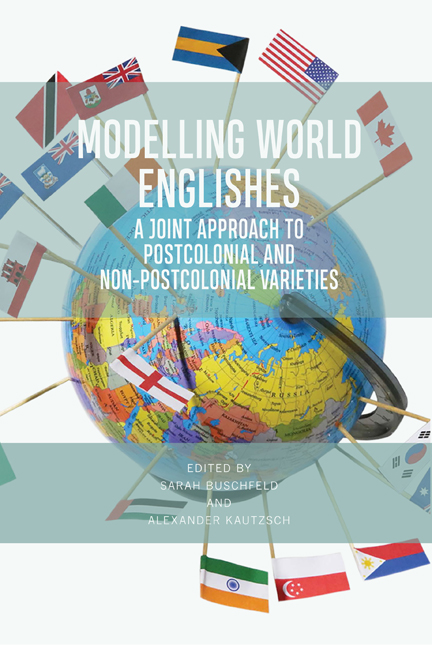Book contents
- Frontmatter
- Contents
- List of Figures and Tables
- List of Contributors
- Foreword
- 1 Introduction
- 2 English in England: The Parent Perspective
- 3 English in Namibia: Multilingualism and Ethnic Variation in the Extra- and Intra-territorial Forces Model
- 4 English in the United Arab Emirates: Status and Functions
- 5 English in India: Global Aspirations, Local Identities at the Grassroots
- 6 English in Singapore: Two Issues for the EIF Model
- 7 English in the Philippines: A Case of Rootedness and Routedness
- 8 English in South Korea: Applying the EIF Model
- 9 English in Japan: The Applicability of the EIF Model
- 10 English in Australia – Extra-territorial Influences
- 11 English in North America: Accounting for its Evolution
- 12 English in The Bahamas and Developmental Models of World Englishes: A Critical Analysis
- 13 Standard English in Trinidad: Multinormativity, Translocality, and Implications for the Dynamic Model and the EIF Model
- 14 Englishes in Tristan da Cunha, St Helena, Bermuda and the Falkland Islands: PCE, non-PCE or both? Blurred Boundaries in the Atlantic
- 15 English in Ireland: Intra-territorial Perspectives on Language Contact
- 16 English in Gibraltar: Applying the EIF Model to English in Non-Postcolonial Overseas Territories
- 17 English in Ghana: Extra- and Intra-territorial Forces in a Developmental Perspective
- 18 Synopsis: Fine-tuning the EIF Model
- Index
5 - English in India: Global Aspirations, Local Identities at the Grassroots
Published online by Cambridge University Press: 24 September 2020
- Frontmatter
- Contents
- List of Figures and Tables
- List of Contributors
- Foreword
- 1 Introduction
- 2 English in England: The Parent Perspective
- 3 English in Namibia: Multilingualism and Ethnic Variation in the Extra- and Intra-territorial Forces Model
- 4 English in the United Arab Emirates: Status and Functions
- 5 English in India: Global Aspirations, Local Identities at the Grassroots
- 6 English in Singapore: Two Issues for the EIF Model
- 7 English in the Philippines: A Case of Rootedness and Routedness
- 8 English in South Korea: Applying the EIF Model
- 9 English in Japan: The Applicability of the EIF Model
- 10 English in Australia – Extra-territorial Influences
- 11 English in North America: Accounting for its Evolution
- 12 English in The Bahamas and Developmental Models of World Englishes: A Critical Analysis
- 13 Standard English in Trinidad: Multinormativity, Translocality, and Implications for the Dynamic Model and the EIF Model
- 14 Englishes in Tristan da Cunha, St Helena, Bermuda and the Falkland Islands: PCE, non-PCE or both? Blurred Boundaries in the Atlantic
- 15 English in Ireland: Intra-territorial Perspectives on Language Contact
- 16 English in Gibraltar: Applying the EIF Model to English in Non-Postcolonial Overseas Territories
- 17 English in Ghana: Extra- and Intra-territorial Forces in a Developmental Perspective
- 18 Synopsis: Fine-tuning the EIF Model
- Index
Summary
INTRODUCTION
The global spread of English in new forms and functions has prompted several suggestions for updates on existing taxonomies or altogether new models of the evolution of Englishes. While most researchers would readily concur with the pronouncement that “recent realities seem to be rendering the ENL [English as a Native Language] – ESL [English as a Second Language] distinction increasingly obsolete” (Schneider 2007: 13), the debate about a similar blurring of the boundaries between ESL/ Outer Circle and EFL (English as a Foreign Language)/Expanding Circle is still in full swing, as this volume testifies. The editors’ own proposal, the Extra- and Intra-territorial Forces (EIF) Model, is designed to ‘decolonise’ (in the sense of Edwards [2016]) Schneider's Dynamic Model of the evolution of postcolonial Englishes (PCEs) in order to include “those types of traditionally Expanding Circle Englishes which appear to be developing into second-language varieties of English even without a (post)colonial history” (Buschfeld and Kautzsch 2017: 105). Schneider himself put forward the notion of ‘Transnational Attraction’ to come to terms with “English in emergent contexts” (Schneider 2014: 24) which do not fit readily into his original model. Yet another framework by Mair (2013) goes one step further in incorporating globalization and transnationalism as constitutive for the dynamics of ‘the world system of Englishes’.
This chapter focuses on the first two models and attempts to tease out each proposal's explanatory potential with respect to speakers of English in India situated at both ends of the lectal continuum. For the young urban middle class, English is a natural part of their linguistic repertoire and arguably also an integral part of their identity. For the large majority of the less affluent, rural population, however, English is a foreign language and a much sought-after commodity for upward social mobility (cf. Uma et al. 2014). We will present the results from an attitude study carried out in and among Mumbai and other parts of Maharashtra, documenting the extent of English usage in different domains vis-a-vis the local languages, as well as Hindi as the overarching official language besides English (cf. Satyanath 2015). Another focus of the study is speakers’ differential attitudes towards English as an identity carrier within their respective social contexts.
- Type
- Chapter
- Information
- Modelling World EnglishesA Joint Approach to Postcolonial and Non-Postcolonial Varieties, pp. 85 - 111Publisher: Edinburgh University PressPrint publication year: 2020



